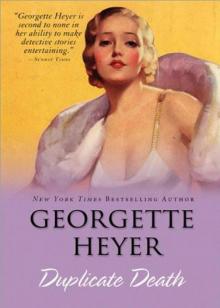Georgette Heyer_Inspector Hemingway 03


Author: Duplicate Death
Category: Other3
Published: a long time ago
Series:
View: 235
Read Online"Pungent dialogue and A1 characterization."-Time magazine"Ms. Heyer is one of the most entertaining writers I have ever read."-Reading Extravaganza"Miss Heyer has the delightful talent of blending humor with mystery."-Boston Evening TranscriptAn elegant card party turns deadly...Inspector Hemingway has his work cut out for him when a seemingly civilized game of Duplicate Bridge leads to a double murder. The crimes seem identical, but were they carried out by the same hand? Things become even more complicated when the fiancée of the inspector's young friend Timothy Kane becomes Hemingway's prime suspect. Kane is determined to prove the lady's innocence-but when he begins digging into her past, he finds it's more than a little bit shady..."Ranks alongside such incomparable whodunit authors as Christie, Marsh, Tey, and Allingham." -San Francisco Chronicle"The wittiest of detective story writers."-Daily MailAbout the AuthorThe late Georgette Heyer was a very private woman. Her historical novels have charmed and delighted millions of readers for decades, though she rarely reached out to the public to discuss her works or private life. It is known that she was born in Wimbledon in August 1902, and her first novel, The Black Moth, was published in 1921. Heyer published 56 books over the next 53 years, until her death from lung cancer in 1974. Heyer's large volume of works included Regency romances, mysteries and historical fiction. Known also as the Queen of Regency romance, Heyer was legendary for her research, historical accuracy and her extraordinary plots and characterizations. Her last book, My Lord John, was published posthumously in 1975. She was married to George Ronald Rougier, a mining engineer, and they had one son together, Richard. Excerpt. © Reprinted by permission. All rights reserved.There were several promising-looking letters in the pile laid on Mrs James Kane's virgin breakfast-plate on Monday morning, but, having sorted all the envelopes with the air of one expectant of discovering treasure-trove, she extracted two addressed to her in hands indicative either of illiteracy or of extreme youth. One was tastefully inscribed in red ink; the other appeared to have been written with a crossed nib trailing a hair. Both were addressed to Mr and Mrs James Kane, but the incorporation of her husband's style with her Own Mrs Kane very properly ignored.Both missives would undoubtedly open with the formula: Dear Mummy and Daddy, but any share in their contents to which Mr James Kane could lay claim would be indicated by the words: 'Tell Daddy'. Such information as was conveyed under this heading would be of a sporting nature. Urgent needs, ranging from money for the defraying of unforeseen and inescapable expenses to the instant forwarding of possessions only to be found after several days of intensive and exhausting search, would be addressed, with rare prescience, to Mummy.So it had been since the grim day of Master Silas James Kane's departure, at the age of eight, to his preparatory school in the West; so it was on this Monday morning in February, although Master Silas Kane was beginning to take more than an aloof interest in such trials of knowledge as the Common Entrance Examination; and his junior, Master Adrian Timothy Kane, had been for several terms pleasurably employed in upholding the tradition set for him at St Cyprian's of throwing himself wholeheartedly into all the more violent athletic pursuits, baiting unpopular masters, and doing as little work as was compatible with physical comfort. Had she been asked to do so, Mrs James Kane could have supplied the enquirer with a very fair paraphrase of either of her elder sons' letters, but this circumstance in no way detracted from the avidity with which she searched through Monday's post, or the satisfaction with which she perused the two documents that made Monday a red-letter day.Neither contributed much to her knowledge of her offspring's mental or physical well-being. An anxious question addressed to Master Adrian on the subject of an unidentified pain which might, or might not, turn out to be a grumbling appendix had been left unanswered, together with an urgent command to Master Silas to Find out from Mr Kentmere when half-term will be so that Daddy and I can make arrangements to come down. Both young gentlemen would have been much distressed by a failure on the part of their parents to put in an appearance at this function, but thus early in the term their minds were preoccupied with more pressing matters, chief amongst which was the need to replace the bath-sponge of one Bolton-Bagby, 'which', wrote Master Adrian Kane, 'got chucked out of the window of Big Dorm.'Mr James Kane, regaled with this passage, grinned, and said: 'Young devil! What's Silas got to say?'Mrs James Kane, in loving accents, read aloud the letter from her first-born. It opened with a pious hope that his parents were enjoying good health; adjured her to tell Daddy that 'we had a match against St Stephen's, we won 15-nil, they were punk'; requested the instant despatch of an envelope containing such examples of the stamp-engraver's art as were known to him as 'my swops'; and informed his mother that owing to the thievish habits of some person or persons unknown a new pair of fives-gloves was urgently required. A disarming bracket added the words: if you can manage it ; and a postscript conveyed kindly words of encouragement to his sister Susan, and his infant-brother William.'So they're all right!' said Mrs Kane, restoring both these interesting communications to their envelopes.Mr Kane did not ask her on what grounds she based this pronouncement. Since his post had contained a demand from the Commissioners of Inland Revenue which anyone less well-acquainted with this body of persons might have supposed to have been an infelicitous essay in broad humour, his son's request for new fives-gloves fell on hostile ears. He delivered himself of a strongly-worded condemnation of his wife's foolish practice of bringing up her children in the belief that their father was a millionaire. When she grew tired of listening to him, Mrs Kane said simply: 'All right, I'll tell him he can't have them.
 Return of Dr Maguire (Mills & Boon Medical)
Return of Dr Maguire (Mills & Boon Medical) The Cowboy's Sacrifice (Double R Legacy Book 1)
The Cowboy's Sacrifice (Double R Legacy Book 1) The Dark Corners of the Night
The Dark Corners of the Night Give a Little Love
Give a Little Love Breaking Point: A SEAL Team Heartbreakers Novella
Breaking Point: A SEAL Team Heartbreakers Novella No Harm Can Come to a Good Man
No Harm Can Come to a Good Man Glorious Sinner: A Lawless Kings Novella
Glorious Sinner: A Lawless Kings Novella Edge of Glory
Edge of Glory